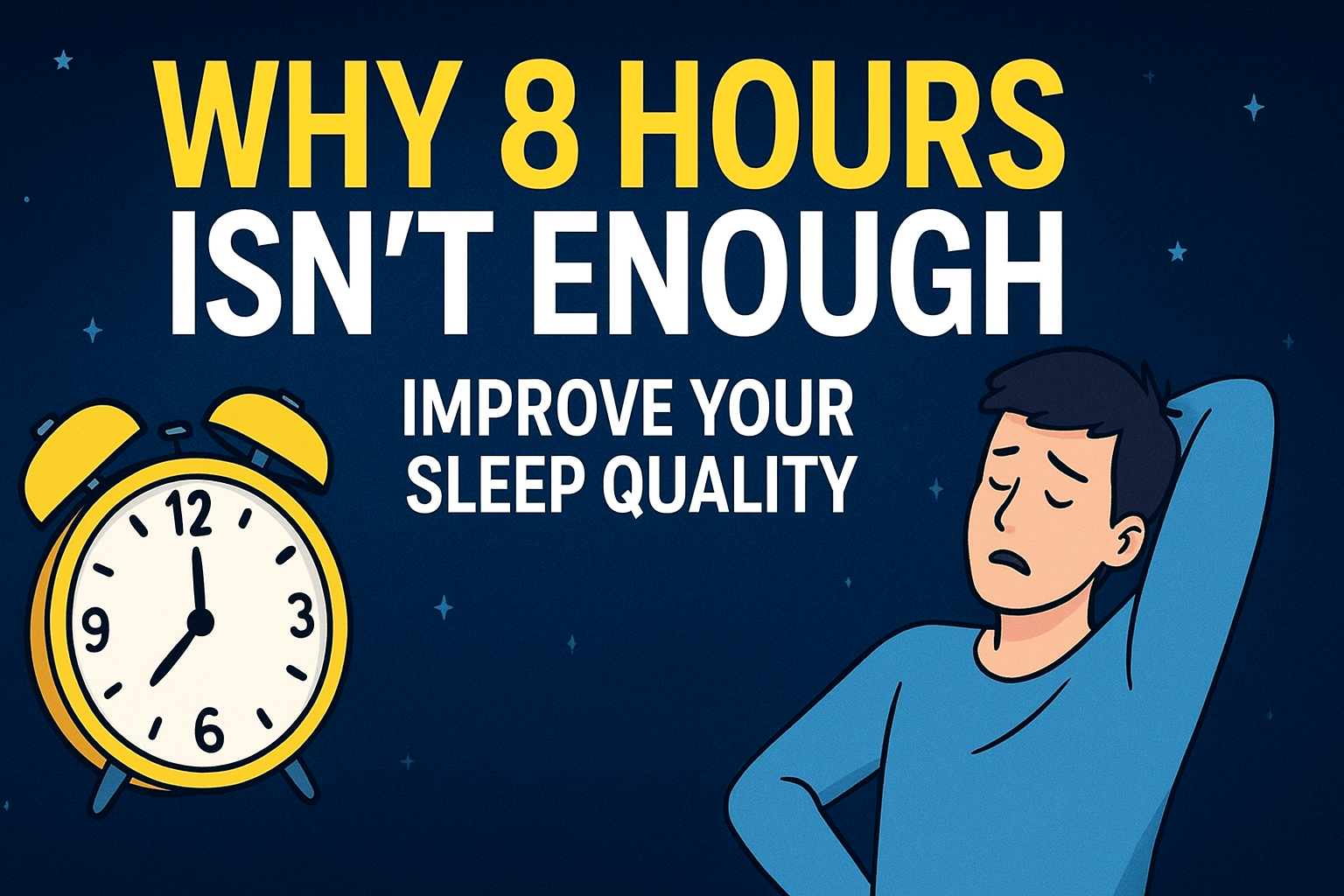why am I still tired after 8 hours of sleep

Why 8 Hours of Sleep Is Not Always Enough
We’ve all heard the advice: “Sleep 8 hours a night and you’ll feel fresh.” But the truth is, not everyone wakes up energized even after a full night’s rest. That’s because sleep quality vs sleep quantity is what really matters. Spending 8 hours in bed doesn’t guarantee proper rest if your sleep cycles are disrupted or you miss out on deep and REM stages.
The Science of Sleep Quality
Good sleep isn’t just about the number of hours you spend in bed—it’s about sleep quality. Sleep happens in cycles that include light sleep, deep sleep, and REM (rapid eye movement). Deep sleep is the stage where your body repairs tissues, strengthens the immune system, and restores energy. REM sleep is equally important because it helps your brain process emotions, improve memory, and support learning. If you don’t get enough deep and REM sleep, you’ll wake up feeling tired—even if you slept 8 or 9 hours.
According to the Sleep Foundation, a truly healthy night’s rest depends on completing multiple sleep cycles. This is why focusing on sleep quality, not just sleep quantity, is the key to waking up refreshed.
1. Poor Sleep Quality
Even if you manage to stay in bed for 8 hours, frequent interruptions—such as noise, discomfort, or waking up multiple times—can stop you from reaching deep sleep and REM sleep. Without these restorative stages, your overall sleep quality suffers, leaving you tired the next day.
2. Lifestyle Factors
Habits like drinking coffee late at night, eating heavy meals before bed, or scrolling endlessly on social media confuse your circadian rhythm (your body’s internal clock). When the circadian rhythm is disrupted, your body struggles to maintain healthy sleep cycles, which makes those 8 hours feel incomplete.
3. Stress and Mental Health
Chronic stress, anxiety, and depression prevent the brain from relaxing enough to enter restorative sleep stages. According to the Mayo Clinic, poor mental health and poor sleep often form a vicious cycle, leaving you drained even after a full night’s rest.
4. Sleep Disorders
Medical issues such as insomnia, restless legs syndrome, and sleep apnea can quietly cut short your rest. In sleep apnea, breathing stops for brief moments, forcing the brain to wake repeatedly. This prevents restorative deep sleep, so even 8 hours in bed may not leave you feeling refreshed.
5. Nutritional Deficiencies
Nutrients like magnesium, iron, and vitamin D are crucial for regulating healthy sleep patterns. Deficiencies can cause insomnia, restlessness, and difficulty staying asleep. Without these essential nutrients, achieving high-quality, restorative sleep becomes difficult.
How to Improve Sleep Quality
The good news is that you don’t have to accept poor sleep as your reality. With the right habits, you can make your rest truly restorative:
- Stick to a sleep schedule: Go to bed and wake up at the same time daily.
- Avoid stimulants: Limit caffeine, nicotine, and alcohol before bedtime.
- Optimize your sleep environment: A cool, dark, and quiet room promotes deeper sleep.
- Reduce screen exposure: Blue light from phones or laptops tricks your brain into staying awake.
- Practice relaxation: Meditation, light stretching, or deep breathing before bed can reduce stress and prepare your body for rest.
For more science-backed strategies, WebMD and Harvard Health both provide expert recommendations for improving sleep quality.
Final Thoughts
Eight hours of sleep is not a magic formula—it’s more of a general guideline than a guarantee. Some people naturally feel fresh and alert after just 7 hours, while others may genuinely need 9 or more to function at their best. What truly matters is the quality of your rest—how deeply you sleep, how many uninterrupted cycles you complete, and whether your mind and body are actually recharging. If you find yourself waking up tired even after a “full” night’s sleep, it’s a signal to look deeper. Maybe your routine needs adjusting, maybe stress is keeping you awake, or perhaps an underlying sleep disorder is quietly draining your energy.
Think of sleep like charging your phone. Leaving it plugged in for 8 hours doesn’t matter if the charger isn’t working properly—the battery still won’t be full. The same applies to you: your body needs more than just time in bed; it needs restorative sleep.
Bottom line: Focus on improving sleep quality, not just hitting a number. Build healthier bedtime habits, keep your environment calm and screen-free, and take stress seriously. If nothing works, talk to a healthcare professional—sometimes the smallest changes can completely transform the way you feel in the morning. After all, waking up refreshed isn’t just about surviving the day, it’s about living it with full energy and focus.
✨ Tonight, don’t just count hours—make your hours count.
This article is based on insights from real-time trends and verified sources including Sleep Foundation, Mayo Clinic, WebMD, and Harvard Health.





thc candy usa shipping discreet secure packaging